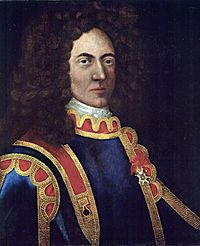Raid on Salmon Falls facts for kids
Quick facts for kids Raid on Salmon Falls |
|||||||
|---|---|---|---|---|---|---|---|
| Part of King William's War | |||||||
 Jean-Baptiste Hertel de Rouville |
|||||||
|
|||||||
| Belligerents | |||||||
Abenaki, Mi'kmaq and Maliseet |
|||||||
| Commanders and leaders | |||||||
| Joseph-François Hertel de la Fresnière Jean-Baptiste Hertel de Rouville |
|||||||
| Strength | |||||||
| unknown | unknown | ||||||
| Casualties and losses | |||||||
| unknown | 34 killed, 54 captured | ||||||
The Raid on Salmon Falls happened on March 27, 1690. It was an attack led by Joseph-François Hertel de la Fresnière and his son, Jean-Baptiste Hertel de Rouville. They worked with Native American groups like the Norridgewock Abenaki, Mi'kmaq, and Maliseet people. Their goal was to attack and destroy the English settlement of Salmon Falls. Today, this place is known as Berwick, Maine. This event was part of a larger conflict called King William's War.
The Attack on Salmon Falls
During the raid, the village of Salmon Falls was completely destroyed. Many of its residents were either killed or captured. Those captured were taken back to New France. The attackers killed 34 men. They also captured 54 people, mostly women and children. The homes and mills in the village were robbed and then burned down.
After the attack, a group of local soldiers from Portsmouth tried to chase the attackers. However, they were stopped in a small fight later that day. After this, Hertel continued his raids, moving towards what is now Portland, Maine.
Originally, the attackers had planned to target the home of Edward Tyng at Fort Loyal. But they changed their minds and decided to attack Salmon Falls instead.
 | Aurelia Browder |
 | Nannie Helen Burroughs |
 | Michelle Alexander |

